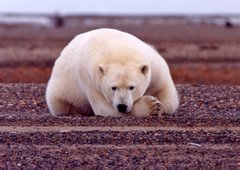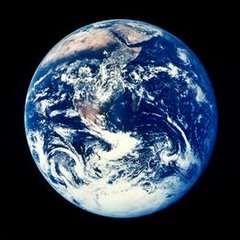Alaska Climate Change Impact Assessment Hearings
Kotzebue, Alaska
by: Lori Hanemann Fickus
The Climate Commission Hearings were held in Kotzebue in June.
Before the actual Hearing, the Commission members toured one of the villages suffering from significant impacts of Climate Change, Kivalina. There they were able to see, in person, what they've been hearing about for months.
Residents of Kotzebue turned out for the important hearing, as well as people from nearby villages. NARF (Native American Rights Fund) once again arranged funding for travel and accommodations to make it possible for several Alaskans to make it Kotzebue to give their account of what's going on in their villages. The emotional and powerful testimonies from the people living their daily lives with these impacts had to sink in (pun intended) to the minds and hearts of the Commission. I am so thankful they are getting out to the rural communities to hear the human element of global warming, in addition to the scientific data they've been gathering. The indigenous knowledge is equally, if not more, important in factoring the impacts.
Northwest Arctic Borough Mayor Siikauraq Martha Whiting was invited to give testimony to the Commission. She provided important details for the Commissions permanent record, and had an interesting idea, "Having an Inupiaq word for it might help convey the urgency". I'm intrigued by the idea of having a word in the major Native Alaskan languages to convey the urgency of the issue. Climate "Change" sounds gradual and un-alarming. What's going on in the Arctic is rapid and urgent. I hope she pursues her idea. She made another good point,
“It’s something that you watch on CNN,” she said, “But it’s something that’s right in our face.”
I hope mothers and the rest of the population in the lower 48 can learn what is happening up here now, will trickle down to them in the near future. The Commission's report is to be turned in January 2008. If you haven't testified already, you can send in your testimony in writing. Please send them to Legislative Staff Tim Benintendi tim_benintendi@legis.state.ak.us





